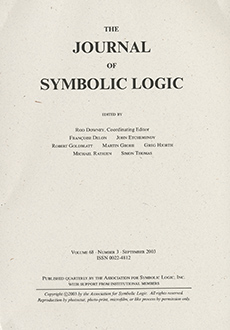Abstract
We give resource bounded versions of the Completeness Theorem for propositional and predicate logic. For example, it is well known that every computable consistent propositional theory has a computable complete consistent extension. We show that, when length is measured relative to the binary representation of natural numbers and formulas, every polynomial time decidable propositional theory has an exponential time (EXPTIME) complete consistent extension whereas there is a nondeterministic polynomial time (NP) decidable theory which has no polynomial time complete consistent extension when length is measured relative to the binary representation of natural numbers and formulas. It is well known that a propositional theory is axiomatizable (respectively decidable) if and only if it may be represented as the set of infinite paths through a computable tree (respectively a computable tree with no dead ends). We show that any polynomial time decidable theory may be represented as the set of paths through a polynomial time decidable tree. On the other hand, the statement that every polynomial time decidable tree represents the set of complete consistent extensions of some theory which is polynomial time decidable, relative to the tally representation of natural numbers and formulas, is equivalent to P=NP. For predicate logic, we develop a complexity theoretic version of the Henkin construction to prove a complexity theoretic version of the Completeness Theorem. Our results imply that that any polynomial space decidable theory Δ possesses a polynomial space computable model which is exponential space decidable and thus Δ has an exponential space complete consistent extension. Similar results are obtained for other notions of complexity.
Citation
Douglas Cenzer. Jeffrey B. Remmel. "Complexity, decidability and completeness." J. Symbolic Logic 71 (2) 399 - 424, June 2006. https://doi.org/10.2178/jsl/1146620150
Information





